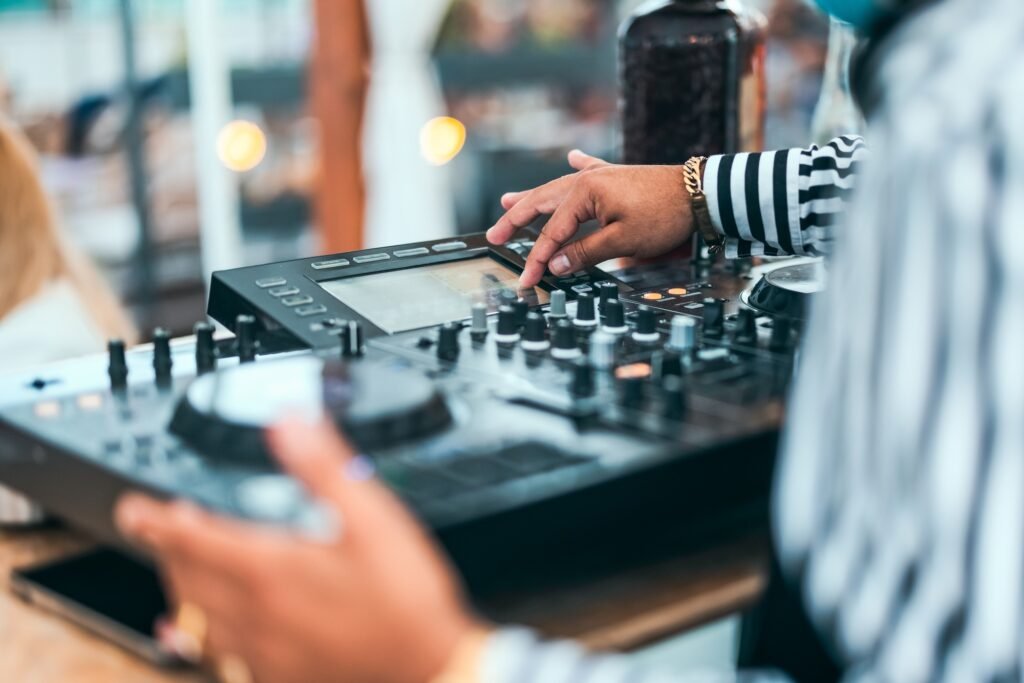Hiring a DJ for your event can significantly impact the atmosphere and success of the occasion. Here are some helpful tips to assist you in choosing the right DJ:
1. Determine Your Musical Taste
- Before you start searching, it’s important to define your favorite music styles and genres. Do you want an all-round DJ, or do you have specific preferences such as house, techno, or Latin? This will help you select DJs that match your desires.
2. Ask for Recommendations
- Ask friends, family, or colleagues if they can recommend a DJ. Personal experiences are often the best way to find a reliable DJ.
3. Check References and Reviews
- Look at the DJ’s website or social media for reviews from previous clients. This gives you a good idea of their style and professionalism.
4. Schedule a Meet and Greet
- Take the time to have a conversation with potential DJs. Discuss your expectations, the atmosphere you want to create, and any specific music requests. This helps establish a good rapport.
5. Inquire About Experience
- Ask about the DJ’s experience, especially with events similar to yours. An experienced DJ knows how to handle various situations and can choose the right music based on the crowd. Be cautious of DJs who only perform at festivals and play a lot of instrumental music; this may not be suitable for a corporate event or wedding. Also, avoid older DJs who occasionally do drive-in shows via marketplaces like Marktplaats; they may not be up-to-date with the latest music and trends.
6. Appropriate Music Selection
- It’s crucial that the DJ plays the right music, fitting the time and atmosphere of the event. For example, playing hardstyle or hardcore music during the dinner of your corporate event is inappropriate, just as techno during the reception. Additionally, ensure that the music does not contain explicit or offensive lyrics. While this seems like standard norms, it’s good to explicitly include this in the contract. If there are multiple artists performing during your event, it’s logical that the DJ does not play hits or music from the main act or singer. This avoids confusion and ensures that the artist’s performance is not undermined.
7. Discuss Equipment and Technical Needs
- Ask whether the DJ will bring their own equipment or if they work with rental companies. Ensure that the sound quality and lighting are suitable for your venue.
8. Clear Pricing Agreements
- Make sure to establish clear agreements regarding costs, including any additional fees for equipment or travel time. Also, inquire about payment terms.
9. Create a Contract
- Ensure everything is documented in a contract to protect both parties.
10. Stay in Touch
- Keep communication open with the DJ leading up to the event, so any last-minute changes can be addressed promptly.
11. Be Flexible
- While it’s good to have a plan, be open to the DJ’s suggestions during the event. They may read the crowd and adjust the music accordingly for the best experience.
12. Plan for Breaks
- Discuss with the DJ how they will handle breaks during their set. It’s important to have a plan in place to maintain the energy of the event.
13. Create a Playlist
- Consider putting together a list of favorite songs or genres that you would like the DJ to play. This helps the DJ understand your taste and expectations better.
14. Ask for a Setlist
- Inquire if the DJ can share a setlist or examples of previous sets. This gives you insight into their style and level of performance.
15. Communicate with Other Artists
- If there are other performers, ensure there is good communication between the DJ and the artists. This helps create a smooth transition between sets.
16. Check Licenses
- Ensure the DJ has the appropriate licenses to play music, especially for larger events.
17. Ask About Backup Plans
- Inquire if the DJ has a backup plan in case of technical issues or illness. This provides peace of mind.
18. Attend a Live Performance
- If possible, attend a live performance of the DJ to experience the atmosphere and audience interaction.
19. Social Media and Promotion
- Ask if the DJ is willing to promote your event on social media. This can help increase attendance.
20. Confirm Arrangements
- A few days before the event, confirm all arrangements and details with the DJ to prevent misunderstandings on the day itself.
21. Plan Setup Time
- Ensure there is enough time for the DJ to set up their equipment and conduct a soundcheck before the event starts.
22. Ensure Good Sound Equipment
- If the DJ does not have their own equipment, make sure to rent reliable sound equipment suitable for the size of your event.
23. Maintain Clear Communication
- During the event, it’s important to have clear communication with the DJ. Designate a contact person who is available for questions or requests.
24. Evaluate After the Event
- After the event, take the time to provide feedback to the DJ and discuss what went well and what could be improved. This can be valuable for future events.

